
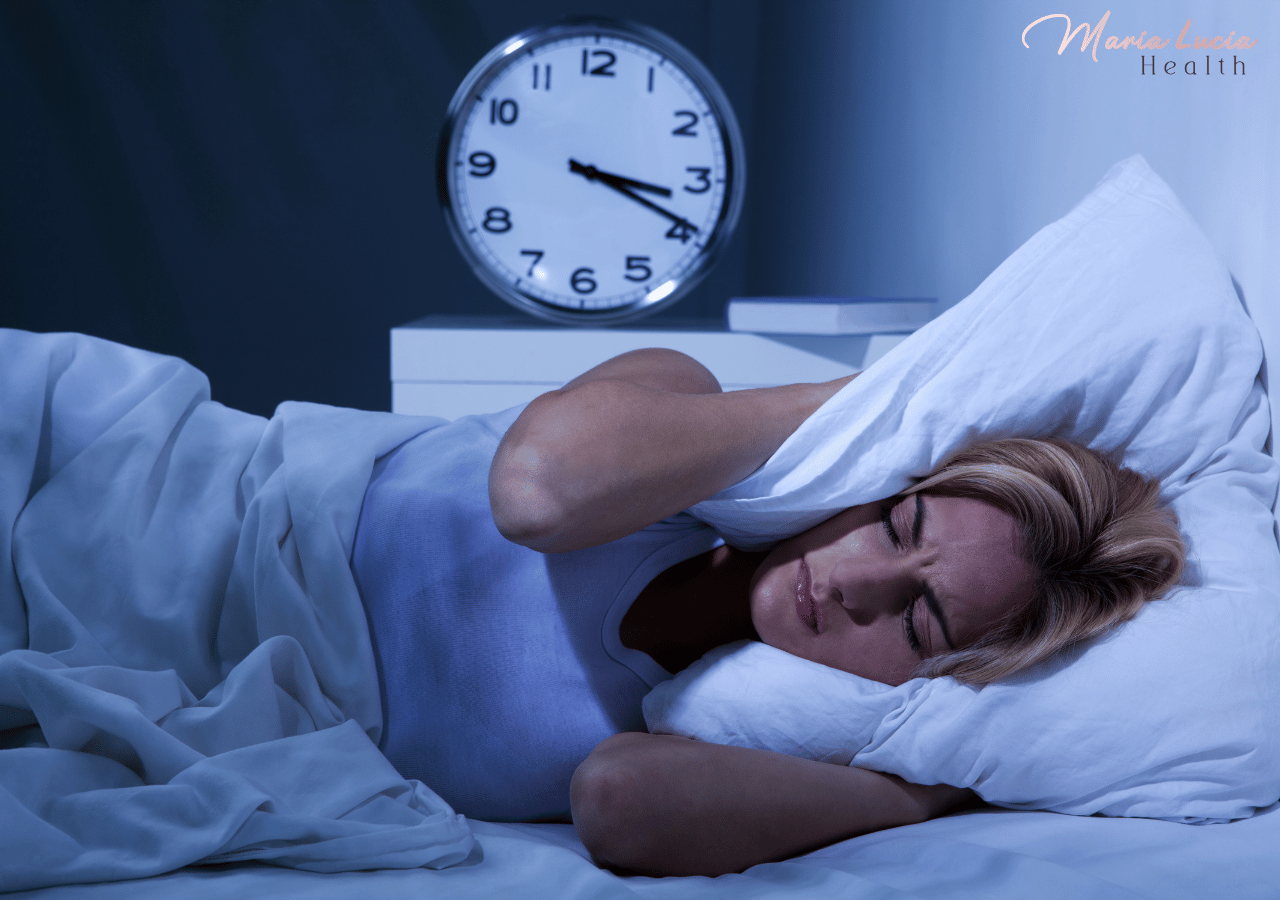
Let’s face it — there’s nothing worse than finally drifting off to sleep, only to find yourself waking up at 3 am, staring at the ceiling, wide awake. You’ve tried everything from counting sheep to sipping chamomile tea, but you just can’t stay asleep. Whether it’s the need to use the bathroom (ugh), or you’re waking up in the middle of the night sweating, feeling like you’ve been tossed into a hot furnace (hello, hot flashes!), it’s frustrating.
And if you’re anything like me, by the time you finally drift off, the alarm is already gearing up to ring.
Sound familiar? Trust me, I get it. In the past, I’ve battled middle of the night anxiety and insomnia thanks to a mix of stress, hormones. and those delightful midnight bathroom trips. But, good news: I learned how to stop waking up in the middle of the night. And I want you to be able to reduce the number of nighttime awakenings too – to 0, ideally!
So let’s talk about why you can’t sleep through the night, and, more importantly, what you can do about it. I’ll share how to fall back asleep quickly, how to reset your sleep cycle, and the most effective tips for sleeping through the night that have helped me the most.
So, what’s behind this nightly wake-up call? There are a few common culprits — especially for women over 40 — and I’m willing to bet you’ve experienced at least one (if not all) of them.
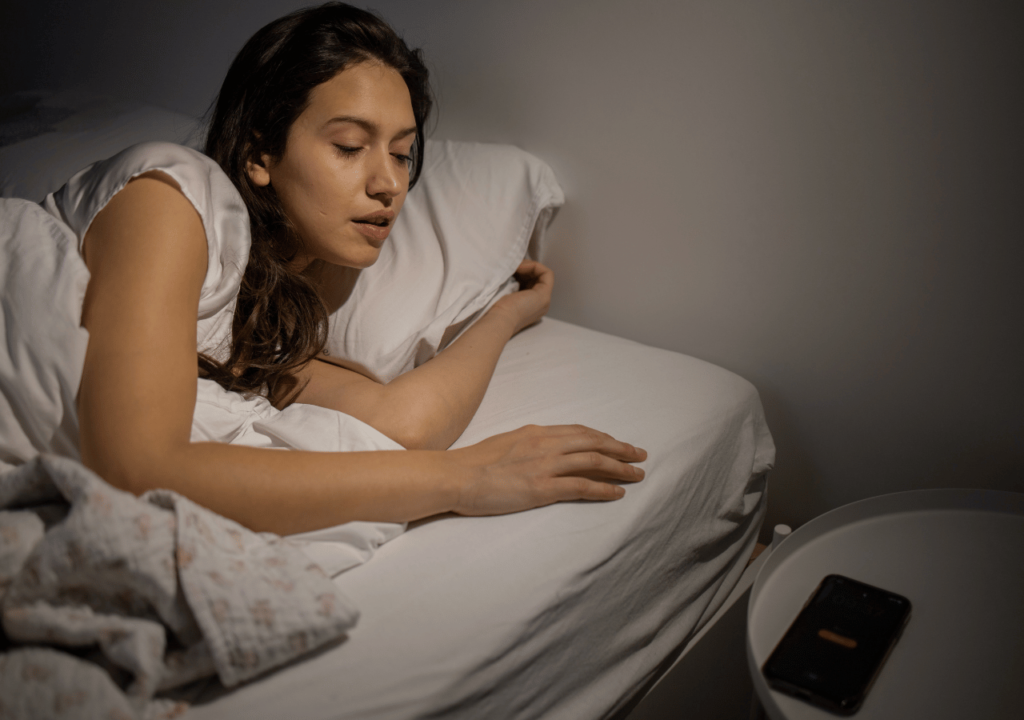
First up: hormones…the joys of perimenopause and menopause! As if hot flashes and mood swings weren’t enough, our shifting hormones love to disrupt our sleep cycles too. Those sudden spikes in body temperature can send you shooting awake in the middle of the night. Suddenly, you’re sweating like you just ran a marathon in your sleep.
Then there’s stress and anxiety. It could be work deadlines, family drama, or just the everyday weight of juggling life – our brains love to hit the panic button right when we need to rest. That’s why you often find yourself wide awake at 2 or 3 or 4 AM, reliving embarrassing moments from middle school or worrying about things that probably won’t happen.
And there’s one more common cause: If you’re waking up to pee multiple times a night, you’re not alone. As we get older, our bladder doesn’t always want to cooperate, and sometimes that midnight sprint to the bathroom becomes a regular part of our nightly routine.
The bottom line? There’s a lot going on behind the scenes, but understanding why you’re waking
up is the first step to finally getting the restful sleep you deserve.
Now, it’s time to talk about what you can do overcome these sleep disruptors…
We all know that hydration is important, but when it comes to sleeping longer without waking up, the answer might actually be to cut back on fluids an hour or two before bedtime.
And no, I’m not talking about alcoholic drinks only — even though you should also reduce those before bed. Any late-night hydration (yes, even water!) can lead to those annoying bathroom trips that stop you from sleeping through the night.
So instead, hydrate throughout the day and limit fluids in the evening.
It’s not just fluids that can mess with your nighttime rest — the wrong types of foods can also contribute to middle-of-the-night insomnia.

And I get it, we’ve all been there — it’s late, you’re watching TV, and suddenly that tub of ice cream is calling your name. But here’s the thing: a heavy meal or sugary snack can disrupt your sleep by spiking your blood sugar. This might be why you’re waking up at 2 AM, wide awake and wondering what went wrong.
Try sticking to a light snack, like a handful of almonds or a banana, if you’re truly hungry before bed. Both are full of nutrients that actually help promote sleep, like magnesium and potassium.
Plus, they’re not going to sit in your stomach like a brick while you’re trying to doze off.
Alright, let’s get real. Sometimes it’s not your hormones, stress, or that extra glass of water before bed — it’s your sleep environment sabotaging you.
Your room should be cool, dark, and quiet to promote uninterrupted sleep. If your room feels like a sauna, you’re basically inviting yourself to wake up drenched in sweat at 2 AM. Ideal sleep happens when your room is around 60-67°F.
The next issue that many people don’t think about is light. If you can practically read a book by the glow of your phone charger, we’ve got a problem. Light, even the tiniest sliver, tells your brain it’s time to wake up. Enter: blackout curtains. They’ll make your room as dark as a cave — no streetlights, no moonlight, nothing but sweet, sweet darkness.
When it comes to waking up during the night, noise is another culprit. That creaky pipe in your house or the distant hum of traffic? It’s not helping. What can you do? If you can’t eliminate the noise itself, get a white noise machine or a fan to block out all that background noise.
Going to bed and waking up at the same time every day (yes, even on the weekends when Netflix is calling) actually helps. Your body loves a good routine. It’s like training a puppy: eventually, it knows when it’s time to chill out and snooze. The same goes for your internal clock.
Stick to a schedule, and over time your body will know when it’s time to release melatonin (the sleep hormone). This is how to reset your sleep cycle. It will make it easier to drift off without tossing and turning.
Now, onto the fun stuff: nighttime rituals! Setting the tone before bed can make a huge difference in how quickly you fall asleep and how deeply you stay asleep.
Nighttime rituals can help you shake off the stress of the day. Here are a few of my favorites:

Reading is a classic. But here’s the catch — page-turning thrillers might have the effect of keeping you up all night – skip them and go for something a little more chill. Read some romance fiction or a self-improvement book instead.
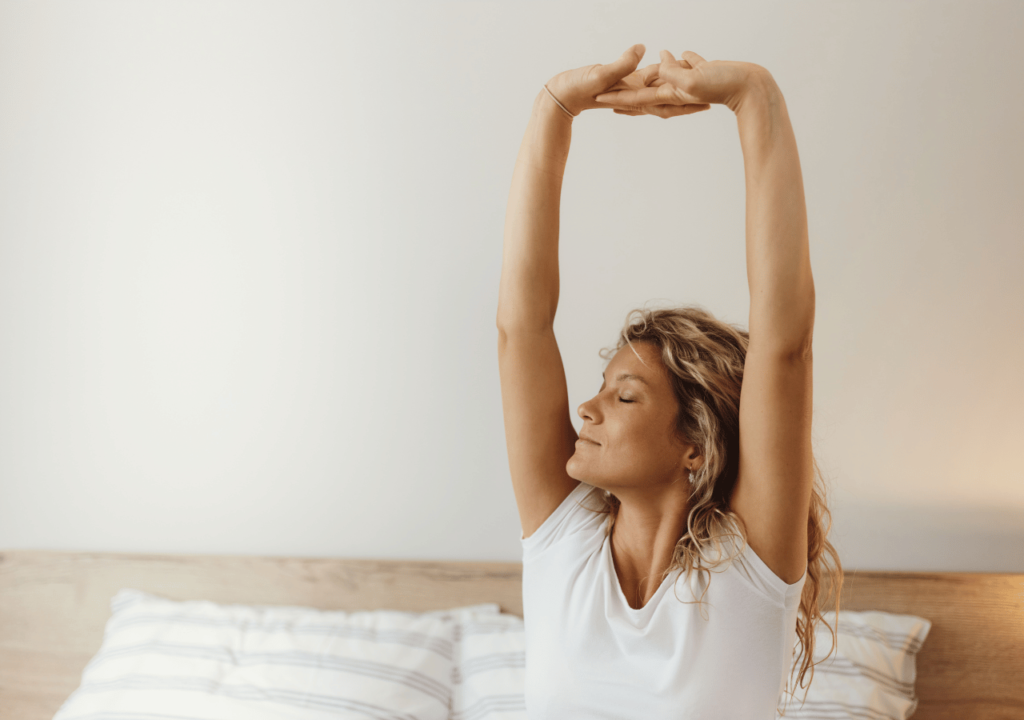
Another option? Light stretching. Nothing intense — just a few gentle stretches to relax your muscles and signal to your body that it’s time to rest. Bonus: it helps shake off the tension from sitting all day.
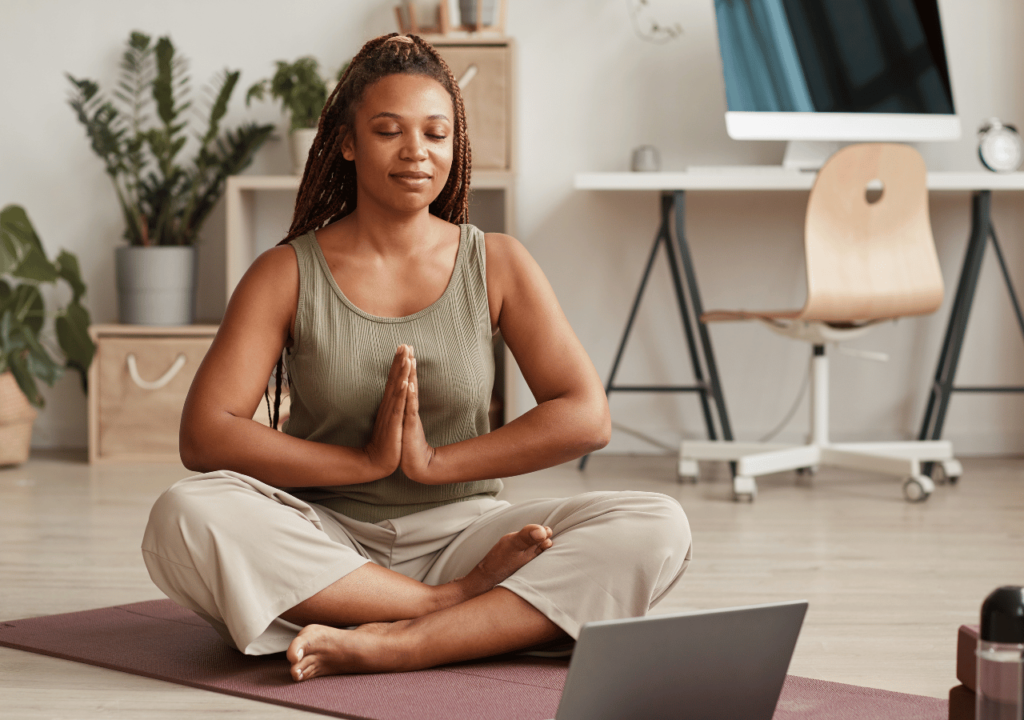
If you’re a fan of meditation (or even if you’re not — yet), let me introduce you to the king of relaxation: David Ji.
His voice is like melted chocolate for your ears. I’m not kidding. Pop on one of his sleep meditations on his YouTube channel, and you’ll feel like you’re floating into dreamland. Even if you’re usually struggling to meditate, his guided meditations might change your mind.
Meditation not only helps you relax, but it also quiets the mind. In this calm state it’s way easier to fall asleep and stay asleep.
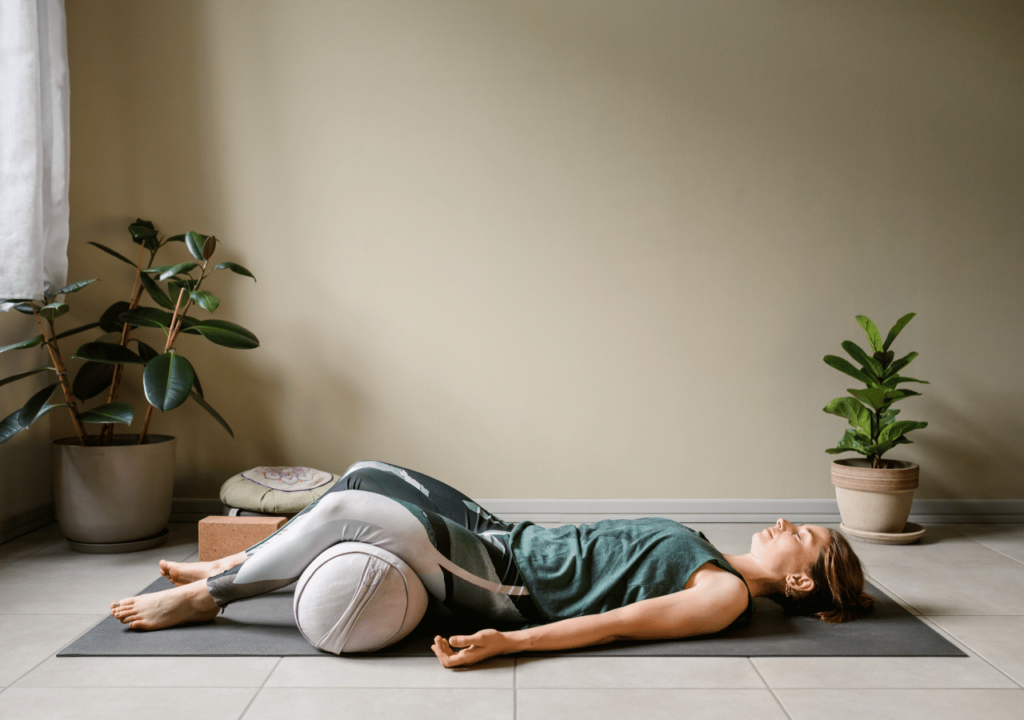
If you don’t have the patience for meditation just yet, you can try progressive muscle relaxation. This is a technique that involves tensing — and then relaxing — different muscle groups in your body. It helps reduce physical tension and can promote deeper sleep.
Give it a try before you go to sleep, or when you wake up and can’t fall back asleep!
Sometimes, even after trying every tip in the book, you still need a little extra help. That’s where supplements can help. But not just any supplements – Dream Woman™ Deep Sleep Aid, to be exact.
I’ve heard from so many women (myself included!) who’ve struggled with sleepless nights, only to find relief with this supplement.
Dream Woman™ is packed with natural ingredients that are specifically formulated to help support women’s sleep needs – especially during perimenopause and menopause.
The best part? It doesn’t leave you feeling groggy in the morning. Just well-rested, refreshed, and ready to take on the day.
Hopefully, with all of these tips, you won’t be waking up multiple times at night anymore. But in the event that it does happen, there are a few ways to fall back asleep quickly:
Sleepless nights don’t stand a chance when you’ve got the right tools in your sleep arsenal.
These tips have worked for me. I used to be frustrated and wonder, “Why can’t I stay asleep?” night after night. Now, here I am, sleeping like a baby every night — well, almost every night…nobody’s perfect.
It might take some trial and error to figure out what works best for you. But with patience, a little self-care, and some of these tried-and-true methods, you’ll be well on your way to finally getting a full night’s sleep.
You deserve a good night’s sleep without interruptions! By keeping your bedroom cool and dark, avoiding late-night snacks and drinks, and winding down with relaxing activities, you can start sleeping through the night. If you need a little extra help, natural supplements like Dream Woman™ Deep Sleep Aid can make a difference.
Give these tips a try, see what works best for you, and look forward to waking up refreshed.
Sweet dreams!

DreamWoman™ Deep Sleep Aid is your key to waking up refreshed, rejuvenated, and ready to take on the day. Try DreamWoman™ today and dream bigger, sleep deeper.
*These statements have not been evaluated by the Food and Drug Administration. The products are not intended to diagnose, treat, cure, or prevent any disease.
© 2024 Maria Lucia Health. All rights reserved.


Use the code at checkout for 10% discount
We noticed you're visiting from Ireland. We've updated our prices to Euro for your shopping convenience. Use United States (US) dollar instead. Dismiss
5 Responses